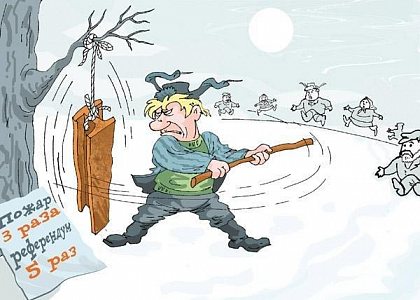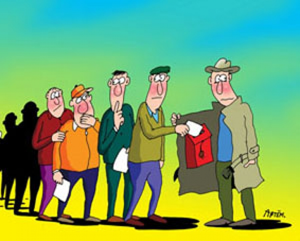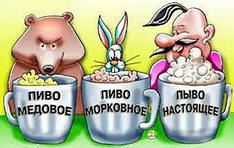
It is clear that all these referenda are out of a zone of a legal framework, however, all that occurs now in Ukraine is out of a zone of a legal framework … Even, if organizers of referenda cheated both in an voters turnout, and with level of support of self-determination (by different estimates level of the cheat can't exceed 10%), we can't ignore these results. The least reason is that the presidential elections are to be organized both in Lugansk, and in Donetsk areas somehow. It will be extremely difficult to do after the referenda. The lowest voter turnout is destined here, and therefore central Kiev authorities can't talk about any level of legitimization of presidential election in these regions. Bloody events both in Odessa, and in Mariupol also don’t promote this process in any way. The population as a whole is simply frightened, buys up products and waits for the worst. It is useless to talk about the presidential election. We will remind that 3, 4 million voters were registered in Donetsk region at the last parliamentary elections in 2012. 1, 8 million were registered in Lugansk. And it is nearly 14% of all voters of Ukraine.
Anyway it is possible to define three main thoughts in the statement of Putin:
1. Russia doesn't intend to pursue policy of further escalation of intensity in the east areas of Ukraine,
2. Russia isn't going to use military forces there
3. Russia is ready to look for recovery from the crisis with attraction of other countries, as western, and, for example, the states of the CIS, and even Ukraine,
These statements calmed intensity temporarily. Everyone waits for continuation of the party.
 Meanwhile even simple public expression of more conciliatory position of Putin affected the financial markets - the ruble became stronger more than on the 60th kopecks and its cost made 35,03 rub for dollar on May 12. Investors and speculators considered that the fears connected with Ukraine are groundless so far. However, this "rebound" doesn't speak about removal of geopolitical risks. They are postponed. Financial analysts advise to wait for Putin's public assessment of the held referendum for clearing of a situation. This assessment may not happen; therefore the uncertainty in the market may amplify. Especially as there is a feeling that events in the southeast of Ukraine go outside any scenarios. In this case the instability in Ukraine is provided for many months or years. It seems that the situation can finally slip in the most dangerous format — uncontrolled randomization of the country.
Meanwhile even simple public expression of more conciliatory position of Putin affected the financial markets - the ruble became stronger more than on the 60th kopecks and its cost made 35,03 rub for dollar on May 12. Investors and speculators considered that the fears connected with Ukraine are groundless so far. However, this "rebound" doesn't speak about removal of geopolitical risks. They are postponed. Financial analysts advise to wait for Putin's public assessment of the held referendum for clearing of a situation. This assessment may not happen; therefore the uncertainty in the market may amplify. Especially as there is a feeling that events in the southeast of Ukraine go outside any scenarios. In this case the instability in Ukraine is provided for many months or years. It seems that the situation can finally slip in the most dangerous format — uncontrolled randomization of the country.
Different versions circulate concerning the reasons of the "peaceful" statement of Putin – from a personal request of the German chancellor A. Merkel to the Kremlin trick and real independence of separatists. It isn't excluded that Putin adopted more cunning tactics: not direct public collision of interests, but indirect – he acts as a "dove of peace", yet informally supporting "the national republics". We will notice that uncontrollable by Kiev power separatists in Lugansk and Donetsk areas support creation of their own state. The questions submitted for a referendum, sound almost equally in both regions. Participants of plebiscite asked to answer, whether they support the “Act of the state independence of the Lugansk national republic and the Donetsk national republic". It is important that they do not mention in questions whether the newly appeared republics be a part of Ukraine. It seems that "the national republics" and Moscow leave themselves a space for the bargaining with the West and with Kiev. It is also confirmed indirectly by the fact that the Russian authorities didn’t interfere with holding a so-called referendum of inhabitants of Lugansk and Donetsk areas in Moscow, though there is no legal ground for its carrying out in Moscow, the city where mass protest actions disperse quickly …
Пройден ли пик напряженности ситуации в Украине? Вряд ли. Сейчас нужно всем запастись терпением. И спокойствием. Объективно наиболее разумным вариантом урегулирования на Украине был бы тот, который на сегодня выглядит абсолютно нереализуемым. Это внешнее управление, навязанное совместно Западом и Москвой. Вплоть до ввода согласованного в ООН или ОБСЕ миротворческого контингента. Но для этого надо не только договориться между собой, поднявшись над вульгарными амбициями, но и отбросить всякие благоглупости по поводу «демократического самоопределения» народа. Результаты референдумов здесь являются только инструментом формирования позиции элит, а не реальным мнением народа, с которым будут считаться на практике. Народ в большей степени просто растерян и не знает что делать. Вспомните референдум по поводу сохранения СССР, проведенный 17 марта 1991 г. (а он как раз был в зоне правового поля). Что стало с его итогами? Ничего. Элиты его проигнорировали. И сделали по-своему. Так и на Украине будет – пока главные стороны конфликта не проявят взаимный интерес не к мнимому, а к реальному урегулированию конфликта, – будет и стрельба, и референдумы, и черт еще знает что. Договорятся – и все успокоится, если и не сразу, то достаточно предсказуемо и вменяемо быстро.
Whether the peak of intensity of a situation is passed in Ukraine? It is unlikely. We all need to stock up with patience and tranquility. Objectively the most reasonable option of settlement in Ukraine looks absolutely unrealizable. This is an external management imposed by the West and Moscow together up to the input coordinated in the UN or OSCE's peacekeeping contingent. But for this purpose it is necessary not only to agree among themselves, having risen over vulgar ambitions, but also to reject any sounding nonsense on "democratic self-determination" of people. The results of referenda here are only the instrument of formation of a position of elite, instead of real opinion of the people with which they will reckon in practice. The people are confused and don't know what to do. Remember a referendum on an occasion of preservation of the USSR held on March 17, 1991 (and it was in a zone of a legal framework). What did become with its results? Nothing. Elite ignored it. They acted in their own way. The same will be in Ukraine: unless the main parties of the conflict show mutual interest not to imaginary, but to real settlement of the conflict, there will be both firing, and referenda, and the devil knows what else. They will agree – everything will calm down if not at once, it is rather predictable and responsibly quickly.
Meanwhile, the Russian-Ukrainian conflict becomes one of factors with which the European Central Bank (European Central Bank) is compelled to reckon when carrying out monetary policy as the head of European Central Bank Mario Drag admitted.
Anyway the current Russian statistics on the financial and consumer markets is very sad.
The Bank of Russia recorded a record demand of the population for currency in March. In its review "The condition of domestic market of cash foreign currency in March, 2014" is told that citizens bought currency on 14,3 bln. dollars in a month. Citizens spent exactly the same sum for purchase of cash currency in December, 2008. Everyone waits for further economic troubles. In March, 2014 the volume of purchase of foreign currency was 1,5 times more, than in February when the population bought 9,6 bln. Dollars. In November, 2008 the volume of purchase of foreign currency the population made 9, 6 bln. dollars too. The volume of cumulative demand was more, than in March, 2012 and 2013, for 66% and twice respectively, also it became the maximum value since January, 2009.
The “Avtostat” analytical agency reported that import of cars to Russia in January - March, 2014 decreased by 15, 6%, to 176 thousand pieces, in comparison with the first quarter of 2013. Import in terms of money fell to 21,6%, to 3,307 bln. Dollars, as the Federal Customs Service (FCS) reported on Thursday, May 7. On the one hand it is clear that top-10 brands of cars popular in Russia are already assembled in Russia. On the other hand it is a reaction of the market to economic and political instability. For the first time for some years the secondary market of cars grew and it is unclear how strong this tendency will be. It is clear that people simply stupidly save money, without hoping for situation improvement in the near future.
 Something similar occurs at the beer market, though, apparently, beer and cars are absolutely different markets. The beer market in Russia in the first quarter of 2014 was reduced by 5% in comparison with the similar period of the last year. The similar assessment is presented in the materials of the Danish brewery Carlsberg published on May 7. The reasons of reduction of demand for beer in the company are closing of booths, macroeconomic instability and unconvincing economic growth. Following the results of 2014 the company predicts decrease in the market of beer in Russia on shipment volume for 5% while earlier decrease following the results of a year was estimated at 2, 5%. Reduction of the Russian market of beer was noted not only by the Danish company. In February other large brewery – the Dutch Heineken – reported that it wrote off 102 million Euros cost of the Russian assets because of deterioration of the market of beer. The reasons specified in Heineken are an increase in excises and a restriction of commercial freedom of beer branch. At the end of 2013 it became known that one more leader of the Russian beer market – the Turkish company Anadolu Efes – was going to suspend one of the plants. It is unlikely that all these events in brewing branch are caused by sharp falling of consumption of beer from buyers. At the time of crises the consumer doesn't refuse habitual products as those. He reduces his consumption a little, or passes to cheaper analogs. In any case we can't call the decrease in beer consumption a positive tendency. It is a sign of a crisis also. The result of this process is the increase of consumption of a cheaper alcohol. That's it. As they say the alcoholization of the whole country is close. The crises will support this
Something similar occurs at the beer market, though, apparently, beer and cars are absolutely different markets. The beer market in Russia in the first quarter of 2014 was reduced by 5% in comparison with the similar period of the last year. The similar assessment is presented in the materials of the Danish brewery Carlsberg published on May 7. The reasons of reduction of demand for beer in the company are closing of booths, macroeconomic instability and unconvincing economic growth. Following the results of 2014 the company predicts decrease in the market of beer in Russia on shipment volume for 5% while earlier decrease following the results of a year was estimated at 2, 5%. Reduction of the Russian market of beer was noted not only by the Danish company. In February other large brewery – the Dutch Heineken – reported that it wrote off 102 million Euros cost of the Russian assets because of deterioration of the market of beer. The reasons specified in Heineken are an increase in excises and a restriction of commercial freedom of beer branch. At the end of 2013 it became known that one more leader of the Russian beer market – the Turkish company Anadolu Efes – was going to suspend one of the plants. It is unlikely that all these events in brewing branch are caused by sharp falling of consumption of beer from buyers. At the time of crises the consumer doesn't refuse habitual products as those. He reduces his consumption a little, or passes to cheaper analogs. In any case we can't call the decrease in beer consumption a positive tendency. It is a sign of a crisis also. The result of this process is the increase of consumption of a cheaper alcohol. That's it. As they say the alcoholization of the whole country is close. The crises will support this
Evgeny Golubev
The inscription on the picture № 1: «Fire - 3 times, referendum - 5 times”
The inscription on the picture № 3: «The honey beer, the marrot beer, the real beer”